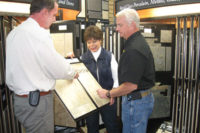Flooring Sales: Presenting the Right Price and the Right Product

There are lots of products and choices out there, like this residential design center at Dillabaugh’s Flooring America clearly demonstrates. Make sure to interview the customer about what they want—don’t just ask for their budget. Photo courtesy of Casey Dillabaugh.
When your next buyer walks onto your showroom floor, you have to ask yourself what is on their mind. What problems have they had in the past making a purchase of a high-ticket item? Then wonder how you’d feel in the same set of circumstances—in short, the “putting yourself in their shoes” cliché.
The buying public is so used to wondering how you intend to trick them. We all know the word salesperson is considered a person who would say anything to close a deal. That means we already have one strike against us the second they walk through that door. Knowing this and also knowing that price is such a big weight on their mind, you have to get past that first hurdle.
Actually, the first hurdle is getting your buyer to like and trust you. If you’ve read any of my more than 500 previous columns, you know the terms “trusted sales advisor” and “the customer interview” are coming next.
Most sales clerks think getting someone to like you takes a great personality and a bunch of phony compliments. Not even close. Take it from a guy who has no smile and gives no phony lines. Believe me, I wish I had a great smile and personality that everyone gravitated toward simply because those are great traits to have in life. But I had to learn early on my shortcomings, and that meant understanding that people will like you when they feel they can trust you. Especially when they walked in with expectations of meeting a slick salesperson.
Do Budgets Matter? I’m amazed at how many sales clerks are scared to discuss big-picture total costs with their customers. At best some will ask “What’s your budget?” Now I understand that they think they are helping a potential buyer by keeping them in their comfort zone. But nothing could be further from the truth.
I want first to know their needs, then their wants. Their means (budget restrictions) may change when we both find them the best product for their given situation.
When I’m out looking to purchase a large-ticket item and the clerk asks “What’s your budget?” you can bet I’m going to lie to her or him or tell them it’s none of their business. When I’m researching my purchase item, I want some real information. I want to know why one thing costs as much as it does and why it is worth more than another. Sure, I might have an idea what I would like to spend, but how do I know I’m actually getting the best product that fits?
When I’m presenting and interviewing a soon to be “trusting buyer,” I don’t even want to know their budget. I want first to know their needs, then their wants. Their means (budget restrictions) may change when we both find them the best product for their given situation.
Let’s say a buyer secretly wants to spend about $4,000. After my customer interview I learn they really need to spend about $4,500. I can take them to the correct product and explain that what they are trying to accomplish will cost them $4,500. People will spend more if they can justify the difference.
Now let’s say I do that same interview and I learn the product that fits their given circumstances will only cost them $3,000. Some of you might say I just left at least $1,000 on the table. Not me. I’m about to make the easiest sale one could ever make. Because I did my job on the interview, gained their trust by looking out for their best interests and that trust got them to like and respect me.
If I had started out with “What’s your budget?” none of this would have taken place. Or even if a sale were made, they would later find out they had spent too much…or too little. The product may have underperformed for their needs or they might figure out you sold them a product that was much more than they needed.
One thing to note with this method is I often make a mistake. It is forgetting about the fact that a handful of buyers simply want luxury. When I hit their means and needs I have to also remember to address their dreams of high-style and luxury. It’s easy to make a sale by just putting them onto a product that will do the job and fit their budget. When you hit that point, make sure you also show and offer a luxury item that fits their decor and style. Now they have the confidence that a lower-priced will do the job, but may decide the luxury item is worth the extra.
To be up front here, I have to tell you this used to be one of the few tricks I used before I got a conscience as a Trusted Sales Advisor. I would always find the product I knew they could afford and wanted to buy. Then I’d show them a product way out of their comfort zone to push them back to purchasing the one they could afford. Today I show them luxury only to make sure I didn’t forget that some buyers can have it all—not only their wants, needs and means, but their dreams.
You may remember a previous column where I explained about working with a very wealthy man. He was a world-famous heart surgeon. Even though I could tell he was rich because his dress, demeanor and car just dripped money, I did the full interview and sold him a very average-priced and average-quality carpet.
Why? Because I found out the carpet was for his pool house that was used only a few months a year by his mother-in-law. He thanked me profusely for not treating him like he was rich and stupid. Then within a year later I helped redesign his mansion for more than $40,000 in flooring and wall tile design.
My advice to you is to never sell by price, but fit the real need or desire. Thanks for reading.
Looking for a reprint of this article?
From high-res PDFs to custom plaques, order your copy today!









